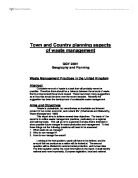• Without adversely affecting the countryside or places of special interest;
• Disposing of waste at the nearest appropriate installation, by means of the most
appropriate methods and technologies.
HEALTH FEARS
• Landfill sites have been investigated as the possible cause of birth defects, cancers and respiratory illnesses including asthma;
• Incinerators have been investigated as to possible increases in cancer, birth defects and respiratory illnesses including asthma. Other studies have particularly concentrated on emissions of dioxins;
• Composting and Materials Recycling Facilities (MRFs) have been investigated for possible exposures to micro-organisms and odours, and lung diseases like bronchitis.
The possible Health Effects of waste management operations have been investigated two
main ways:
• Epidemiological studies – these are studies of the distribution (or pattern) and determinants (or causes) of disease in human populations.
• Emissions based studies – which measure emissions being released into the environment from one or more sources. Based on this, human exposures to emitted substances can be estimated, and the risks to human health can be assessed.
ENVIRONMENTAL CONCERN
There is also concern about the environmental effects of facilities which deal with municipal solid
waste.
For example, emissions from municipal solid waste processes might affect acid rain or global warming.
Plant life near landfill sites might be affected by landfill gas or water contaminated by waste, if these are allowed to escape from a site.
Odours or noise from municipal solid waste facilities are occasionally a problem.
The possible Environmental Effects of waste management operations have been investigated in several ways:
• Monitoring levels of pollutants emitted from landfill sites in communities located near to
landfill sites, where this is not already carried out as part of regulatory monitoring;
• Studying how much particulate matter, micro-organisms, organic chemicals and methane is
released from composting of municipal solid waste;
• Measuring emissions of micro-organisms and fungal spores from all forms of municipal solid
waste management;
• Looking at what and how much is emitted to air, to sewer and in solid residues from processes
which are not yet widely applied to municipal solid waste in this country – mechanical biological treatment, and anaerobic digestion.
The available research includes reports from theEnvironment Agency, the UK Government, a recent study by the Irish Government, and work by the American Agency for Toxic Substances and Disease Registry, Greenpeace, and other organisations. These reviews discuss and draw together the conclusions of other studies but don’t usually put numbers on possible health effects or put the conclusions into context
Substances Of Concern
Carbon Dioxide
Dioxins and Furans
Hydrogen Chloride
Hydrogen Fluoride
Individual volatile organic compounds: benzene, chlorobenzene,
chloroethane, chloroethene, 1,1-dichloroethane tetrachloroethene
Metals: arsenic, cadmium, mercury, nickel
Methane
Nitrogen Oxides
Particulate Matter
Polychlorinated Biphenyls
Sulphur Dioxide
ENVIRONMENTAL POLICY
Waste management is often very simple, and usually brings financial savings and reduced environmental damage.
Waste management is usually considered in a hierarchy of different options:
- this is the best and most cost effective solutions
including and - where minimisation isn't possible.
- the last resort and most costly option.
Waste decision-making should be based on the following principles
• Individuals, communities and organisations should take responsibility for their waste;
• In taking decisions there should be consideration of alternative options in a systematic
way;
• Engagement with the local community and key stakeholders should be an important
and integral part of the decision making process;
• The environmental impacts of possible options should be assessed looking at both the
long and short term;
STRUCTURE
Action and Delivery:
Data Collection and Analysis:
Evaluation of Options:
Timescales:
Integration with Other Plans:
Strategy Scope:
Partnership Working:
Communication and Consultation:
Risk Management:
Monitoring and Evaluation:
CHECKLIST FOR EFFECTIVE IMPLEMENTATION
All those who produce or handle wastes from demolition, earthworks and construction activities have legal responsibilities – Duty of Care – (Duty of Care is a legal requirement under Section 34 of the Environmental Protection Act 1990.)
for its safe keeping, transport and subsequent recovery or disposal. Failure to comply can result in an unlimited fine.
It is recommended to set up a task force with clear responsibilities for the work to
be carried out.
1. Are political understanding and support for the waste management planning process present?
2. Have sufficient resources been allocated to the process?
3. Scope of the waste management plan:
_ What is the geographical coverage of plan? National, regional or local?
_ Which waste streams will be included in the plan? Total waste, municipal waste, hazardous waste, packaging waste, other?
_ Which sectors will be included in the plan?
_ What is the time horizon of the plan? e.g. 3, 5 or 10 years?
4. Have the participants in the planning process been identified? Do they include government departments, local authorities, waste experts, representatives from the waste management sector and the waste generating industry, and NGOs?
5. Has the time schedule for preparation of the waste management plan been set? Time estimates for the work should be realistic.
6. Have any relationships between the waste management plan and other plans (e.g. spatial planning, energy planning, etc.) been identified? Do they influence elements in the waste management plan?
CONCLUSION
“The ideal is to produce no waste at all!
But every one of us can reduce the amount we produce and re-use as much as
possible of what’s left
What we can’t re-use, we must try to recover by recycling or composting.
When recycling or composting proves impossible, we should consider burning the waste to produce energy.
Only as a last resort should we ever think of burying it.”







